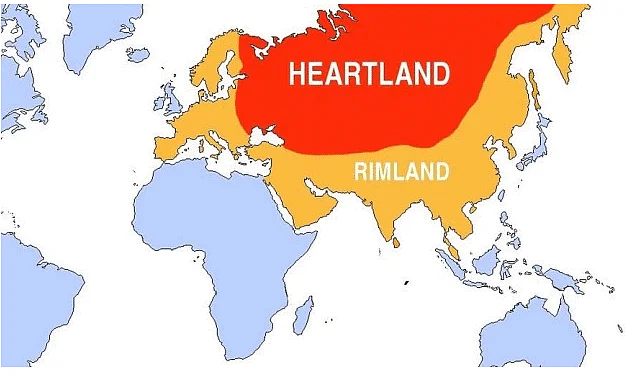The Rimland theory is a geopolitical concept in international relations that was proposed by American military strategist and historian, Rear Admiral Alfred Thayer Mahan. The theory asserts that the coastal rim of a continent, especially the littoral regions, is the most strategically important area for a country’s security and economic prosperity, and therefore, it should be the main focus of the country’s maritime strategy.

According to the theory, the rimland is the interface between the land and the sea, and it is where a nation’s economic, political, and military interests intersect. This region is vulnerable to attack from the sea and is the gateway to the Heartland. The control of the rimland would therefore give a country a strategic advantage over its rivals.
The theory of Rimland was widely influential during the Cold War and was used to justify the US military’s focus on the Pacific region, particularly Southeast Asia. However, in recent times, the relevance of the theory has diminished as global economic and political power has become more dispersed, and the influence of sea power has declined relative to air and land power. Nevertheless, the concept of the rimland remains an important part of geopolitical analysis and continues to inform modern maritime strategy.
Benefits of Rimland,s theory
The Rimland theory proposes that the coastal rim of a continent, specifically the littoral regions, is the most strategically important area for a country’s security and economic prosperity. According to the theory, control of the rimland would give a country a strategic advantage over its rivals and would allow it to protect its economic, political, and military interests.
One of the main benefits of the Rimland theory is that it highlights the significance of the coastal regions and the importance of maritime power in shaping a country’s strategic interests. The theory argues that control of the rimland would allow a country to project its power and influence, both in its own region and globally.
In terms of economic benefits, the Rimland theory asserts that the littoral regions are critical for a country’s economic prosperity as they are the gateway to the Heartland and are often centers of trade, transportation, and commerce. By controlling the rimland, a country would have access to key trade routes, resources, and markets, which would give it a competitive advantage in the global economy.
Overall, the Rimland’s theory provides a useful framework for understanding the strategic importance of coastal regions and the role of maritime power in shaping a country’s security and economic interests. However, its relevance has diminished in recent times as global economic and political power has become more dispersed, and the influence of sea power has declined relative to air and land power.
FAQs
Q: What distinguishes the Rimland Theory from Mahan’s Sea Power Theory?
A: While Mahan’s theory focuses on maritime dominance, Spykman’s Rimland Theory emphasizes the critical importance of controlling the Eurasian Rimland, a vast landmass encompassing key nations.
Q: Does the Rimland Theory UPSC still apply in the modern era?
A: Absolutely. The ongoing geopolitical struggles in regions like the Middle East and South China Sea affirm the enduring relevance of Spykman’s theory.
Q: How did Nicholas Spykman’s background influence the development of this theory?
A: Spykman’s experiences as a Dutch-American scholar and his observations of World War II greatly influenced his perspective on global geopolitics.
Q: Can you provide examples of current geopolitical developments that align with the Rimland Theory?
A: The rivalry between the United States and China in the South China Sea and Russia’s involvement in Eastern Europe are prime examples of contemporary events that reflect Spykman’s theory.
Q: What role does geography play in the Rimland Theory UPSC?
A: Geography is central to Spykman’s theory. He believed that the geographical location of nations in the Eurasian Rimland determined their strategic importance in global politics.
Q: How can one apply the insights from the Rimland to understand current global conflicts?
A: By analyzing the geopolitical interests and actions of nations in the Eurasian Rimland, one can gain valuable insights into the motivations behind contemporary global conflicts.
Conclusion
In conclusion, the Rimland theory upsc is a cornerstone in the field of geopolitics. Its emphasis on the Eurasian Rimland as a critical theater of power struggles continues to shape the way we perceive international relations.
As we navigate the complex web of modern geopolitics, Spykman’s insights remain invaluable. By understanding the nuances of this theory, we can better comprehend the ever-evolving dynamics of our world.

Document Article. Was’t whatever i ended up specifically hunting for however My husband and i did some searching Aol your posting showed up i really tested versus eachother and additionally wished to no less than thanks a ton.